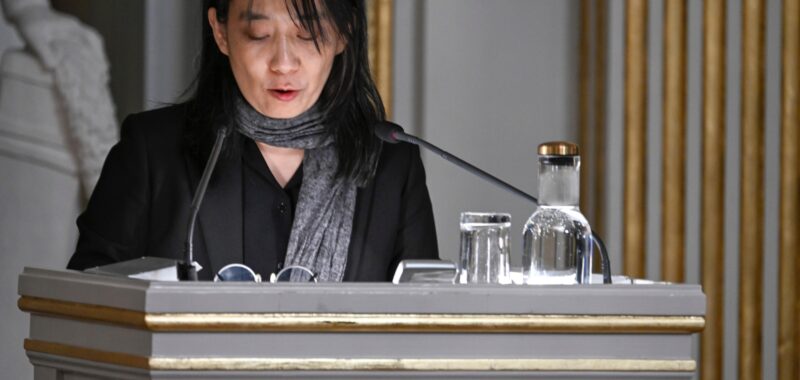STOCKHOLM — South Korean author Han Kang, this year’s winner of the Nobel Prize in Literature, spoke passionately on Saturday about the process of writing and her evolution as a writer — all the way back to when she was 8 years old.
Han, the first Asian woman and the first South Korean writer to win the Nobel literature prize, was delivering her Nobel lecture in Stockholm, the Swedish capital. She described in a soft-spoken voice how in January she found an old shoe box containing several several diaries dating back to her childhood.
Among the stack of journals, she found a poem about love she had written. “The lines penned by my eight-year-old self were suitably innocent and unpolished,” she said.
Han was awarded for her novels, including “The Vegetarian” and “Human Acts,” that explore the pain of being human and the scars of Korea’s turbulent history. She is known for her experimental and often disturbing stories that incorporate the brutal moments of modern South Korea.
The Nobel Committee praised Han “for her intense poetic prose that confronts historical traumas and exposes the fragility of human life.”
The author spoke Saturday about how she involves all of her senses in the creation of some of her best known works.
“When I write, I use my body,” she said. “I use all the sensory details of seeing, of listening, of smelling, of tasting, of experiencing tenderness and warmth and cold and pain, of noticing my heart racing and my body needing food and water, of walking and running, of feeling the wind and rain and snow on my skin, of holding hands.”
In her lecture she expressed gratitude at those moments when she senses that she was able to transmit those “vivid sensations” to her readers.
“In these moments I experience … the thread of language that connects us, how my questions are relating with readers through that electric, living thing,” Han said as she finished her lecture.
“I would like to express my deepest gratitude to all those who have connected with me through that thread, as well as to all those who may come to do so.”
Han delivered her speech in Korean, but a translation into English and Swedish was posted on the Nobel Prize’s website.
There will be a ceremony and banquet for her and the other laureates on Tuesday Nov. 10, the anniversary of Alfred Nobel’s death.

